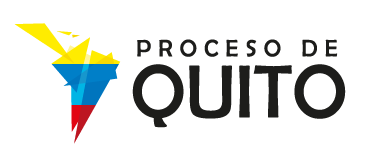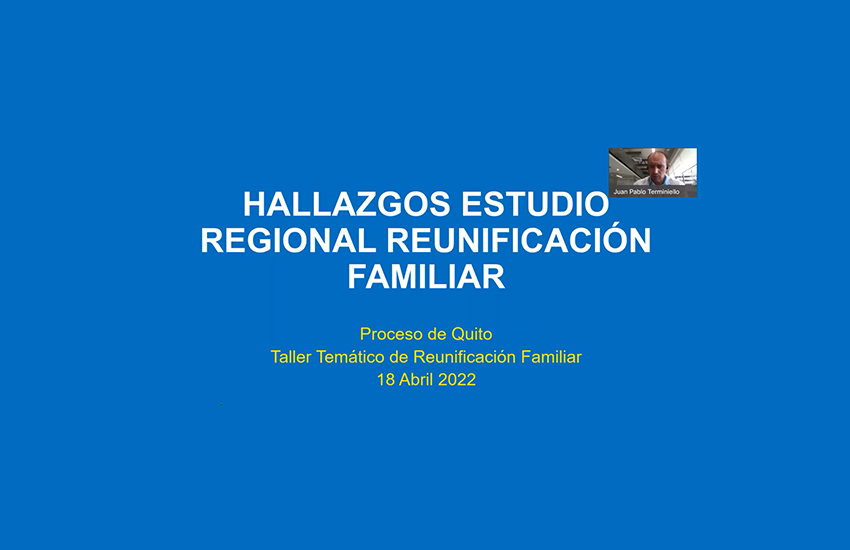Costa Rica presented Regional Study on Family Reunification
It points out the need for articulated actions between the countries of the Quito Process in the search for lasting solutions through basic regional standards for the development of a regional guide.
By Isadora Zoni
Brasilia, April 18, 2022 — In the Thematic Workshop led by Costa Rica, the leading country of the Family Reunification axis, the main findings, recommendations and good practices of the regional diagnosis on family reunification processes for refugees and migrants were presented.
Costa Rica expressed its interest in establishing a technical committee to develop "Regional Guidelines for Family Reunification", in consultation with States, civil society, refugees and migrants, regional organizations and other relevant actors, and regional organizations and other relevant actors, and based on the recommendations of the regional assessment. The leading country is supported in this area by UNHCR, IOM and UNICEF.
International and regional regulatory framework on family reunification
The right to family unity is derived from article 16 of the Universal Declaration of Human Rights (1948), and is reinforced by others such as articles 9, 10 and 22 of the Convention on the Rights of the Child (1989) and the Declaration of New York on Refugees and Migrants, which apply to all people, regardless of status or legal status. More specifically, in the case of children, the Convention on the Rights of the Child recognizes the right not to be unnecessarily separated from their families.
National legislation and current public policies
The conceptualization of the nuclear family of refugees for purposes of status extension is recognized by: Argentina, Bolivia, Brazil, Chile, Costa Rica, Colombia, Ecuador, Mexico, Panama, Paraguay, Peru, Dominican Republic and Uruguay. Most of the countries part of the Quito Process included grandparents, fathers, mothers, sons and daughters of legal age, among others, recognizing in some cases those between the fourth degree of consanguinity and the second degree of affinity, as in the case from Brazil, Mexico and Uruguay.
Regarding the members of the migrant family, the nuclear family enjoys full acceptance, while the extended family is recognized in more than half of the countries that participated in the regional study. Panama, for example, considered family members between the fourth degree of endogamy and the second degree of affinity for the granting of residence visas to Venezuelans. To this we must add that the criteria used by various States to ensure family unity for refugees and migrants, family unity for refugees and migrants emphasizes family ties, linking the concept of family to emotional family ties, linking the concept of family to emotional dependence, as is the case in Argentina, Brazil, Bolivia, Chile, Costa Rica, Mexico and Uruguay, Chile, Costa Rica, Mexico and Uruguay.
Regional study recommendations
Despite a strong legal structure across the region, some key challenges to refugee and migrant family reunification are identified. The Regional Study establishes a set of recommendations with the aim of improving the current situation of these processes in the region:
- The establishment of guidelines/regional directives to guide and support States in strengthening family reunification processes, and to strengthen the adoption of procedures and mechanisms applied uniformly in the region;
- Strengthen the legal structures and administrative procedures that guarantee safe and regular access to the territory of refugee and migrant families seeking reunification, bearing in mind that there is no single family model and, therefore, the protection family must be carried out guaranteeing equal rights and non-discrimination;
- Priority processing by States of applications for family reunification, especially in the cases of children and adolescents, especially those separated and unaccompanied, including the situations provided for in the procedures to determine the best interests, as well as facilitating access to visas. family reunification at the consulates of the countries of origin or transit;
- relaxation of administrative requirements (eg documents and fees) in family reunification procedures, especially for refugees and migrants in vulnerable situations;
- The strengthening of the cooperation between the States - especially the protection systems for children and adolescents - in the promotion of family reunification processes involving children and adolescents, especially those separated or unaccompanied, always in accordance with the principle of the best interest mentioned above.
- Strengthening of public policies aimed at supporting the local integration of refugees and migrants who are reunited with their families.
The Office points to the need to strengthen regional cooperation to overcome two obstacles observed in the area of family reunification, making it clear that the relevance in the articulation of the Quito Process is intuitive and the need for joint and coordinated efforts in the region.
Tools and resources:
+ Nota conceptal Reunificación Familiar PDQ, Brasilia 2022.
+ Proceso Quito Reunificación Familiar Reunión 18 Apr 22.


